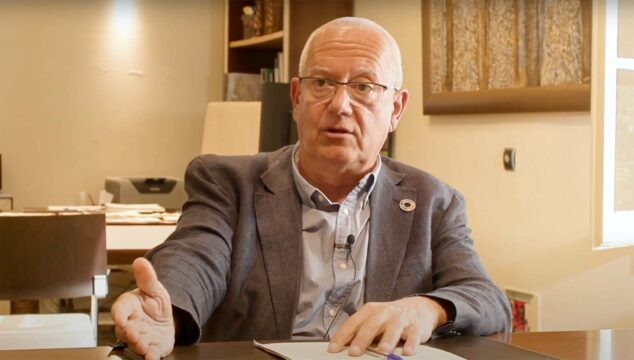Three years ago the residents of Dénia, and of the whole country, stayed at home for the first time in a forced way. A threat, practically science fiction until it knocked on our door, was outside. On March 14, 2020 we did not go out, and it was only the first day of many weeks where uncertainty changed our lives forever.
First it was the hotel industry, then the schools and then the Fallas. There were three closures and cancellations in a row, with a difference of a few hours. The news piled up and was impossible to digest. We knew many things, but no one knew anything. It was impossible. Who in any municipality of any country was prepared for what was to come and that was going to put the entire planet in check?
We met three years later with Vicent Grimalt, the mayor who had to manage, like so many others, an entire city from home and with the same doubts as anyone. Of course, with much more responsibility. How do you overcome what you don't understand because tens of thousands of people depend on it? How has it changed us? How has Dénia changed after the pandemic, and now forever?
This is a brief excerpt from our conversation, you will find the complete interview at the end of this news.
ASK. How did you experience the first news of a virus that was gradually approaching, but that was still outside our borders?
ANSWER. with uncertainty. With much disbelief. It has happened many times. Some virus from southern Africa, central Africa or Asia that goes off. But we thought that the same as always was going to happen: that it would stay there and that's it. In the end, obviously, it was not so. Unfortunately.
Q. You thought it couldn't affect us.
R. I thought so, that it could affect us. But that he wasn't going to be so deadly, so contagious. We thought that it would be one of these viruses that would pass, like Avian Flu or Influenza A, or these viruses that are seasonal... That it would be more or less the same.
Q. However, in March 2020 we began to receive worrying news such as the closure of schools, hotels, even the cancellation of Fallas. How was that chaos lived from the City Hall?
R. The Fallas thing was something that marked a before and after. When they tell me that the Fallas have to be suspended, that's when you really say “uf, this is serious”. At first, no one knew that this was going to happen or what was going to happen.
It was clear to me that this could last a week or several, and that it would happen. We even consider doing the Fallas on the May bridge or at the Fiestas de Sang Santíssima. But you never expected the virus to be so virulent.
Q. But, as you say, in the end they confine us. At first it seemed like it would last 15 days, but it got longer. Did you think it would last that long?
R. I also thought that if it was such a contagious virus through the air, if everyone stayed at home with their family units and we didn't leave there, there was no reason for the virus to continue circulating. But when we realized that no, that it was getting worse and worse... Now it's been exactly three years and it still hasn't disappeared.
P. I would like you to tell what it is like to be mayor of Dénia from home. And how a city is administered from there.
R. From home, at first, well crazy. Because we were not prepared for this. I remember that during the first days we had to start buying laptops quickly so that everyone, at least the most important technicians and services, could continue working from home and the administration machinery would not have to stop. Among other things, because it was necessary in Social Services to implement all the help that was needed.
"We went from distributing between 30 and 35 thousand euros a month in aid to about 50 thousand a week"
Suddenly they tell you “we are going to have a meeting on Zoom”. And of course, that Zoom... what is that? When you realize that these platforms do work, that's fine, but in those first moments when we had to take the step to buy equipment so that people could work from home, it was difficult.
Q. Because we were not prepared.
R. We were not prepared. No one was ready for teleworking from home. But look, we can work from home and a public administration can work from home.
Q. The confinement is extended longer than expected. You have to take measures to face the economic crisis derived from the pandemic. What was done in this regard?
R. Start injecting money into Social Services and the nursing home from other departments that we knew we were not going to spend, such as Festivals, Culture, Sports, and some others. Because the demand was brutal. We went, if I remember correctly, from distributing between 30 and 35 thousand euros a month in aid to about 50 thousand a week. Sure, the money had to come from somewhere.
Then you had all the help that companies, SMEs, professionals who were out of work needed... That's many millions of euros that we had to put on the table to help them.
If Social Welfare has always been a priority for us, in this case it was necessary. We couldn't look away. It was a lot of money that has still dragged on, since then, with aid plans, especially for companies, and that we will continue to do so. But at that time we had to help people. In that situation you have to take whatever it is from anywhere and make it available to those people who need it.
Q. With the de-escalation, you have to take care of the distance. Dénia begins to bet on increasing the areas dedicated to pedestrians, even establishing the pedestrianization of Marqués de Campo.
R. We closed Marqués de Campo from the beginning so that the bars, ice cream parlors and other premises would have space to place tables outside while maintaining that distance so that companies could work. And just as we did it in Marqués de Campo, we did it in many other places.
I think we launched actions that other municipalities later copied us, and luckily some that can no longer be reversed, such as the closure of Marqués de Campo.
Q. So, has the pandemic caused the change in the city or has it accelerated it?
R. I think it has accelerated. We had in mind that Carrer Campo had to be pedestrianized, like other streets that had to improve and increase the sidewalks so that people have more space to walk quietly. The thing about carrer Campo was to speed it up. If we planned to do it after two years, we did it then.
I think that today people are immensely grateful that Carrer Campo is a pedestrian street.
Q. A change that visitors also take advantage of. The truth is that in our high seasons, the summers, of 2020 and 2021 I saw a lot of people. I didn't have that feeling that we had lost tourism. Did the pandemic affect Dénia at a tourist level like other towns, such as Benidorm?
R. Dénia has a very important difference: 50% of tourism is family from a second residence. They have the house here. In Benidorm if it is not 100%, 90% are hoteliers and with foreign clients who cannot come. Of course, there the slap is immense. In Dénia, the luck we had is that many people are from the capital of Valencia, who could come here when we could not leave the communities.
Q. It may sound harsh, but the fact that the borders were closed... did it favor us?
R. He favored us. Visitors from the south of the province do not usually come to Dénia. I know of people who have come and discovered Dénia, because they used to go further south. Not being able to leave the community, they decided to go up. For the first time they came to our house.
Q. Have we come out better?
R. No. No. That's what they said before: "we will come out better", "people will be more responsible", "people will take care of themselves". At first we all thought so. But today go out and tell me what difference there is from January 2020 to March 2023. No, we have not come out better. We have left as we were before. It's as if nothing had happened.








Everyone, everyone and everyone who was involved will be held accountable sooner or later. It is clear that they are afraid or they would not publish such exculpatory articles.
You're right, Gloria. All the actors in the monumental deception of the last three years should pay the price that corresponds to their personal responsibility and they have no doubt that they will.
I thought the mayor's intervention was very serious, saying that they had a problem with the unvaccinated. I realized that I was following a script and neither the prospectuses nor the technical documentation of the COVID 'vaccines' had been read, which already demonstrated their impossibility of avoiding contagion and the multiple side effects that we now suffer. Your responsibility is to be up to date with information. His intervention was disinformation to citizens.
We were not prepared.
Responsibility on the front line.
Lots of innocent lives in the middle and THEY WERE NOT PREPARED.
Really, you lose the desire to vote for any politician.
From the Popular Radical Movement we propose the immediate pedestrianization of Pare Pere street.
Grimalt resignation!